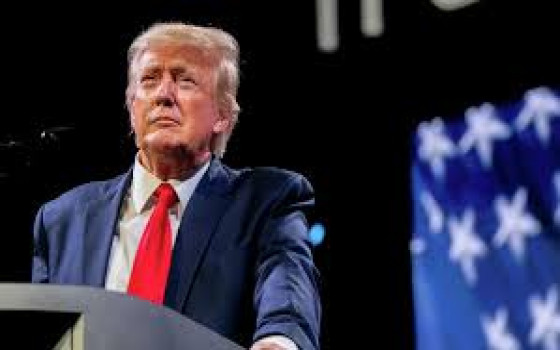
Warning of Washington's policy ambiguity, the IMF raises global growth forecasts after Trump eases tariffs. Consultations continue with Beijing to extend the tariff truce. India will face tariffs exceeding 20%.

- Europe and Arabs
- Wednesday , 30 July 2025 8:5 AM GMT
Brussels - Washington: Europe and the Arabs - Agencies
US Treasury Secretary Scott Besant said that the United States and China will continue to discuss the terms of extending the tariff truce, indicating that the final decision will rest with President Donald Trump.
Besant, who led the US delegation alongside Trade Representative Jameson Greer, said in statements from Stockholm that he will brief Trump on the remaining issues on Wednesday, according to Bloomberg.
The third round of trade talks between the United States and China concluded in less than three months, two weeks before the August 12 deadline to resolve differences, amid a temporary 90-day suspension of the high tariffs that threatened to cut off bilateral trade. According to the Cairo-based Youm7 website, citing news agencies, the report added, "US President Donald Trump said on Tuesday that India will likely face tariffs of 20% to 25%, despite not having reached a trade agreement with it yet.
The American website Axios reported that whether tariffs of 20% or more are imposed, they would also be significantly higher than recent deals Washington has struck with major trading partners such as Japan and the European Union, as well as smaller partners such as Indonesia and the Philippines.
The International Monetary Fund raised its forecast for global economic growth for 2025, noting that uncertainty still surrounds US policies despite the partial easing of trade tensions, warning of continued downside risks.
The International Monetary Fund raised its forecast for global economic growth for 2025 after US President Donald Trump eased his most extreme tariff threats, contributing to a recovery in global trade and an expansion in economic activity.
The Washington-based fund stated that the White House's "de-escalation in tariffs" helped The outlook improved, but it warned that US policies remain "highly uncertain" and that risks to growth "remain decisively negative."
The IMF's chief economist, Pierre-Olivier Gourinchas, revised his forecast for global economic growth in 2025 to 3%, compared to a previous estimate in April of 2.8%. The forecast for 2026 increased from 3% to 3.1%. The global economy had grown by 3.3% in 2024.
Improvement across regions: According to the Brussels-based Euronews website, most regions have benefited from this positive trend, including the United Kingdom, which is expected to grow by 1.2% this year, an increase of 0.1 percentage points over the previous forecast.
British Chancellor of the Exchequer Rachel Reeves said: "The IMF forecast shows that the United Kingdom remains the fastest-growing European economy within the G7, despite the global economic challenges we face."
She added: "I am determined To unleash Britain's full potential, we are investing billions of pounds in our plan for transformation – in jobs through improved regional transport, providing unprecedented funding for affordable housing, and supporting major projects like the Sizewell C plant.
Tariff Threats Roll Back and Political Gains for Trump
In April, Trump threatened to impose steep import tariffs on the world's major commodity exporters, including the UK, the EU, China, and South Korea, under the pretext of fighting unfair competition.
This threat led to a sharp decline in stock markets and a fall in the value of the US dollar, as investors sought safe assets. Later, Trump decided to postpone or reduce tariffs in exchange for pledges to buy American-made products, which led to markets recovering some of their gains, amid investors' conviction that "Trump always rolls back," in what became known as "Taco."
Over the weekend, Trump announced that he would not impose a 30% tariff on EU imports, but would limit it to 15%, in exchange for European concessions that included purchasing approximately $1 billion worth of American oil and gas. £600 billion. The French Prime Minister described the trade agreement as a "dark day for Europe."
Japan also recently agreed to purchase Boeing aircraft as part of an agreement that maintains tariffs on its exports to the United States at 15%. Trump also eased tariffs on Chinese goods, but only after Beijing retaliated with punitive tariffs on rare earths used in defense industries.
Warnings of Continued Uncertainty
Gourinchas explained that the United States had "partially reversed course," reducing the effective tariff rate from 24% to around 17%.
He added: "Despite this positive development, tariffs remain at historically high levels, global trade policy remains highly unstable, and only a few countries have reached comprehensive trade agreements."
He noted that the White House has set an August 1 deadline for trade deals with several countries, including Vietnam and South Korea, adding: "In the absence of comprehensive agreements, continued trade uncertainty could increasingly weigh on investment and economic activity."
He also warned that the situation could worsen if political pressure on central banks escalates, which could It undermines its independence. Trump has repeatedly called on US Federal Reserve Chairman Jerome Powell to cut interest rates, calling him "stupid" for failing to do so.
Gourinchas said, "It is important to affirm and maintain the principle of central bank independence. The evidence is overwhelming that independent banks, with a narrow mandate to achieve price stability and economic growth, are essential to anchor inflation expectations."
He pointed out that the "soft landing" achieved by banks around the world despite inflation is largely due to their independence and hard-earned credibility.
US Trade Deficit Narrows
Data released Tuesday showed that imports of goods into the United States fell by $11.5 billion in June, to $264.2 billion, following a surge earlier this year as companies sought to import before tariffs were imposed.
This decline contributed to a narrowing of the US trade deficit to $86 billion in June, down from $96.4 billion in May.












No Comments Found